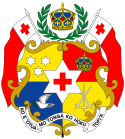 |
|---|
| Constitution |
| Administrative divisions |
Parts of this article (those related to the democratic reforms implemented in 2010) need to be updated. (March 2012) |
The politics of Tonga take place in a framework of a constitutional monarchy, whereby the King is the Head of State and the Commander-in-Chief of the Armed Forces. Tonga's Prime Minister is currently appointed by the King from among the members of Parliament after having won the support of a majority of its members. Executive power is vested in the Cabinet of Ministers. Legislative power is vested in the King in Parliament, and judicial power is vested in the supreme court.
Tonga joined the Commonwealth of Nations in 1970, and the United Nations in 1999. While exposed to colonial forces, Tonga has never lost indigenous governance, a fact that makes Tonga unique in the Pacific and boosts confidence in the monarchical system. The British High Commission in Tonga closed in March 2006.
Tonga's current king, Tupou VI, traces his line directly back through six generations of monarchs. The previous king, George Tupou V, born in 1946, continued to have ultimate control of the government until July 2008. At that point, concerns over financial irregularities and calls for democracy led to his relinquishing most of his day-to-day powers over the government.[1]
- ^ "Tonga's king to cede key powers", BBC, July 29, 2008